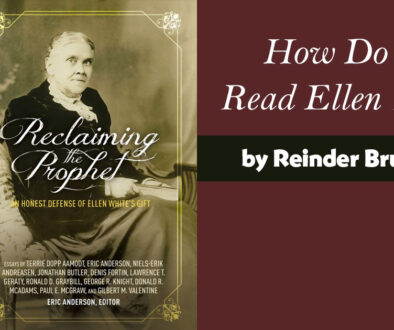Fighting for the End of the World
by Robert Crux | 21 June 2024 |
Imagine an influential movement of Christian fundamentalists in the United States who, with millions of dollars in backing and connections into government, are fighting for the end of the world. Imagine people with such a mindset engineering American politics and foreign policy to bring about the very thing they seek: the apocalypse.
Going one step further, imagine a substantial number of Seventh-day Adventists supporting this unification of church and state movement because it has the potential to usher in the Second Coming of Christ much sooner.
According to the Bible, it sounds like the end of the world is none of our business:
“But about that day and hour no one knows, not even the angels of heaven, nor the Son, but the Father alone” (Matt. 24:36).
However, there are many well-organized fundamentalist Christian leaders and their followers willing to work towards making this apocalypse/second coming scenario a reality as soon as politically possible. And the willingness to trade grace for power by uniting church and state is at the movement’s core.
Praying for Armageddon
This movement has recently been explored in the documentary film Praying for Armageddon: a chilling look at the pastors, politicians, and power brokers who are agitating for the apocalypse, now. It is a political thriller that investigates the dangerous consequences of the fusion between Evangelical Christianity and American politics.
White evangelicals, the demographic most interested in the rapture content of the apocalypse, are overwhelmingly Trump supporters. They have positioned Donald Trump as a messianic figure which has supercharged the language about a soon-to-be spiritual—and earthly—conflict known as the battle of Armageddon.
Cristina Masa, writing for Newsweek, says:
“Many evangelical Christians believe that Trump was chosen by God to usher in a new era, a part of history called the “end times.” Beliefs about this time period differ, but it is broadly considered the end of the world, the time when Jesus returns to Earth and judges all people.”
When the decision was made in 2017 to declare Jerusalem the capital of Israel, and move the United States Embassy there, the United States evangelical community applauded enthusiastically, believing it moved the world closer to Armageddon.
Chris Lehmann, in his article “American Evangelicals Await the Final Battle in Gaza,” writes:
“For most observers, the war in Gaza is a horrifying escalation of tensions in the Middle East, pitting a heavily armed Israeli state in a self-styled “existential” crusade against a stateless civilian population, bringing a brutal toll of casualties and the prospect of permanent displacement. Yet for many in the American evangelical world, the news out of Gaza is a crucial foretaste of redemption—the prelude to the final battle for earthly power, to be followed by Armageddon and the Rapture.”
The Christian nationalism movement in the United States believes Israel to be the axis of global politics. Many of its followers champion the idea that events surrounding Israel will trigger a war where Muslim nations attack, fulfilling the biblical Armageddon prophecy. With American help, this battle allegedly will restore Israel’s supremacy over the world and the return of the Christian Messiah. For many American evangelicals who are followers of Christian nationalism, they see the Israeli-Hamas War in Gaza as the harbinger that brings about Armageddon and the rapture.
Powerful political, religious, and military leaders are seemingly ready to pull the trigger on a “holy war” that could be devastating to global civilization. Do these leaders see themselves as instruments fulfilling this apocalyptic prophetic vision? According to the vision of Christian nationalists and many evangelicals, these leaders are needed in their fight to bring the world to an end.
The end justifies the means
The expression “the ends justify the means” supports the idea that if the end result is good, then it doesn’t matter if the means to that end were wrong… all that really matters is the end result. This Machiavellian attitude means that if a goal is perceived as morally important enough, any method of getting it accomplished is acceptable. So far, Evangelicals and other Christians have consented to look the other way when the ideology of “the end justifies the means” can be effectively used to accomplish their religious and political goals.
For evangelicals, there is no greater moral responsibility than to end the world by any means necessary. One could argue that they are the new religious Machiavellians whose threads into government have reshaped American politics and foreign policy in ways no one would have believed a generation ago.
The unconditional support evangelicals and Christian Zionists have for Israel in the current Gaza War is underscored not only by the so-called blessing prophecy (Genesis 12:3) but the overwhelming desire to bring the world to an end with Armageddon and the Rapture. Therefore, their influence in the US Congress to provide funding and arms equipment for Israel to win this war in spite of the 30,000+ innocent Palestinians that have already died in this conflict is unparalleled.
The Gaza slaughter of civilians and children continues on an almost daily basis and United States ends up being complicit in this slaughter with its military support. The Israeli Defense Forces’ (IDF) requiring a million Palestinians to leave their homes in a very short time (with nowhere to go) means death for many of the most vulnerable in Gaza.
Sarah Posner, a columnist for MSNBC writes:
“For many “Christians Zionists,” and particularly for popular evangelists with significant clout within the Republican Party, their support for Israel is rooted in its role in the supposed end times: Jesus’ return to Earth, a bloody final battle at Armageddon, and Jesus ruling the world from the Temple Mount in Jerusalem. In this scenario, war is not something to be avoided, but something inevitable, desired by God, and celebratory.”
The conservative evangelical church in America has fused its spirituality with its politics to the degree that thousands of innocent Palestinian lives are considered acceptable collateral damage in order to move the world closer to the return of Jesus Christ.
Adventists and the second coming
The second coming is the very heartbeat of the hope that lives in Adventists. Is it safe to say that for those Adventists eagerly anticipating the second coming, any progress is welcome? Are they willing to risk being complicit in the slaughter of innocent civilians and refugees, including thousands of children in Gaza, by not expressing compassion or humanitarian support?
Bettina Krause, in her recent Adventist Review article, “The Accidental Christian Nationalist,” writes
“…the temptation for many of us is fear. We see society’s norms changing. We hear other Christian leaders talking in grim tones about the rise of secularism. We understand the challenges—both existing and potential—of living in a society in which respect for traditional religion is waning. And so, we drift into a Christian nationalist mindset of “us” versus “them,” “Christian” versus “other.” Almost unconsciously we find ourselves on the battlefield, supposing that we need to defend America as a “Christian nation.”
If a substantial number of Adventists can be described as accidental Christian Nationalists, does this include the popular rationale of many evangelicals and Christian nationalists—that the end justifies the means when it comes to moving the world closer to the second coming?
Drifting into a mindset that is willing to trade grace for the political power to influence end times can be a temptation difficult for many Adventists to resist… since each generation of Adventists has been taught to believe in the Second Coming of Jesus and that it is likely to occur in their lifetime.
Further, Adventists appear morally conflicted when it comes to the war in Gaza. There is a certain cognitive dissonance that happens when Adventists alternate between “pray for peace” and “let’s get excited because Jesus is coming soon.” Our non-Adventists friends would likely find this reasoning disingenuous and even offensive.
History has demonstrated that Adventists tend to play it safe with their silence and inaction during periods of national conflicts. The church’s immorality of silence during the Apartheid era in Africa in the mid-70s did not go unnoticed. In the Rwandan Genocide in 1994, Adventist Christianity was indistinguishable from the other groups outside the Adventist subculture.
Hastening the end
Postmodern people, including religious groups, feel a profound need to have the problems of their lives solved. However, being caught up in a religious or political movement that promises to fulfill Bible prophecy on its own terms reveals a lack of trust in God and has no biblical basis of support. God does not need our help in deciding the time of the Second Coming!
We are reminded of the example of Christ’s ministry when He walked on this planet. He mingled with people in the course of their daily work and sought to understand and meet the needs of those around Him.
Likewise, meeting the needs of people around us in this sin-saturated world is what God’s righteous people do and how they can hasten the second coming. Then they share the good news of Jesus and bid people “Follow Him.”
 Robert D. Crux, Ed.S, worked as a teacher, principal, and superintendent of schools over a period of 35 years in Adventist education before retiring in 2016 to Lawton, Michigan, where he enjoys writing, reading, biking, model railroading, and, most of all, his grandchildren.
Robert D. Crux, Ed.S, worked as a teacher, principal, and superintendent of schools over a period of 35 years in Adventist education before retiring in 2016 to Lawton, Michigan, where he enjoys writing, reading, biking, model railroading, and, most of all, his grandchildren.




